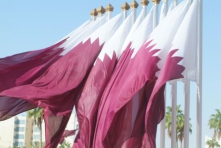Qatar's Low Profile in African Energy
Qatari diplomatic relations with sub-Saharan Africa remain ‘a work in progress’, concludes a briefing paper* by French foreign affairs think-tank IFRI published on its website last week.
Author Benjamin Auge notes that, while having several embassies in the Arabic-speaking north and northeast of Africa, Qatar has no Mozambique embassy despite the likelihood that huge LNG projects are expected to be launched there in the 2020s by Eni and Anadarko which are likely to undercut and potentially weaken Qatari contractual prices in order to secure Asian market share. Qatar still runs relations with Mozambique out of its South African embassy, opened in 2003. Qatar has had an embassy since 2012 in Tanzania, also with huge offshore gas reserves, but Tanzania has none in Doha.
Qatar Petroleum (QP) and Exxon are reportedly looking at buying into Eni’s 50% interest in Mozambique's offshore Area 4, which boasts 85 trillion ft³ of gross gas reserves. Auge however notes that Qatar has yet to invest in Mozambique’s upstream, even onshore. QP prefers to work through joint ventures with majors such as Exxon, Shell and Total rather than bilaterally with African governments or their national oil companies, he adds.

Qatari flags (Photo credit: Qatari embassy in South Africa)
When QP has invested upstream in Africa, it has tended to be in blocks operated by majors – such as with Total offshore Mauritania in 2006 and more fruitfully offshore Congo-Brazzaville (the Moho Nord oil development) in 2013, and with Chevron where QP took a 30% interest in February 2016 in three deepwater Moroccan exploration blocks.
Qatar is not interested in African countries as client states, but more in communal interests, argues Auge, editor of Africa Energy Intelligence. Thus Kenya and Senegal's efforts to secure discounted energy supplies from Qatar were never refused outright, but instead were kicked into the long grass. In contrast Nigeria and Qatar have worked together as fellow Opec members since the latter’s independence in 1971, and QP has worked closely with South African firm Sasol because the latter provided gas-to-liquids technology for its Oryx plant in Qatar.
The latter partnership rewrote the narrative, in Qatari eyes, that Africa was poor and risky. Since then, a joint venture of three Qatari holdings – Nebras Power – has held talks as an active investor in a 500-MW gas-fired power plant (CCGT) near Mombasa in Kenya (2013) and discussed a floating LNG import terminal (FSRU) coupled with a 400-MW CCGT both near Dakar (with an MOU signed May 2015). Neither however has yet seen a final investment decision. In the steel, tourism and food sectors though, actual Qatari joint developments in Africa have occurred, he notes.
* ‘La relation diplomatique entre le Qatar et l'Afrique subsaharienne. Une histoire en construction’ Benjamin Auge, IFRI, July 2016 (in French only)
Last month NGW featured an IEA report discussing China's role as an investor in sub-Saharan Africa's energy sector.
Mark Smedley


